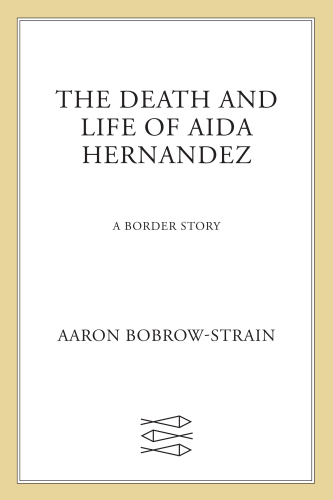
The Death and Life of Aida Hernandez
A Border Story
کتاب های مرتبط
- اطلاعات
- نقد و بررسی
- دیدگاه کاربران
نقد و بررسی

February 1, 2019
A professor combines his academic research with his decadeslong U.S.-Mexico border activism to brightly illuminate immigration realities by focusing on the struggles of one young woman.In this powerful saga, Bobrow-Strain (Politics/Whitman Coll.; White Bread: A Social History of the Store-Bought Loaf, 2012, etc.), a founding member of the Walla Walla Immigrant Rights Coalition in Washington state, focuses primarily on Agua Prieta, Mexico, just across the border from Douglas, Arizona. Until around 1990, the border between the two towns seemed mostly invisible. Douglas residents often shopped, dined, and worked in Agua Prieta, and vice versa. Aida Hernandez--not her actual name, an anonymity the author explains in detail--was born in Agua Prieta in 1987. Until age 9, she resided in Mexico, impoverished but generally content. When Aida's mother left Mexico with her and her siblings to escape a violent marriage, vast complications began. The new man in the family's life turned out to be worse than the biological father, but they were dependent on him for lodging and food and cowed by his threats to have them deported back to Mexico. Although Aida dedicated herself to performing well in school and learning fluent English, her undocumented status meant constant uncertainty. It also meant that she was vulnerable to violent male figures, ranging from her mother's paramour to Aida's boyfriends to abusive Border Patrol agents. When Aida had a son at age 16, her lack of adequate income and her overall vulnerability became far more complex since every decision she made would affect her child. Bobrow-Strain met Aida through a social worker whose own complicated border saga mingles with many others portrayed by the author in vivid and often agonizing detail. The settings eventually transcend Agua Prieta and Douglas to encompass immigration detention centers, overwhelmed immigration courts, and, eventually, New York City, where Aida and her son battle for a better life.This potent, important work, which "occupies a space between journalism and ethnography, with a dash of oral history and biography," adds much to the continuing immigration debate.
COPYRIGHT(2019) Kirkus Reviews, ALL RIGHTS RESERVED.

February 18, 2019
In this merger of “journalistic nonfiction and ethnography,” politics professor Bobrow-Strain narrates the story of Aida Hernandez, who grew up an undocumented immigrant in Douglas, Ariz.; married and had a child with an American citizen; was deported in 2008 to Mexico at age 20; and, not long after, returned to the U.S. in an ambulance after she was stabbed and left for dead by a stranger. After the stabbing, Hernandez developed PTSD, exacerbated by fears she’d be deported and separated from her son again. Four years later, she was arrested for misdemeanor theft and spent 10 months in the Eloy Immigration Detention Center before getting a green card. Interwoven with Aida’s story are those of her father, a former socialist revolutionary; Rosie Mendoza, a former undocumented immigrant who became Aida’s social worker; and the twin border towns, Douglas and Agua Prieta, Mexico. Bobrow-Strain draws from dozens of interviews with the principal actors in the story, including four years of collaboration with Hernandez, providing him an insider’s perspective that elevates the narrative above simple reportage. This is a riveting and distressing account of one woman’s immigration nightmare, and a well-researched argument against the status quo in border security.

April 1, 2019
On the surface, this compelling account traces an undocumented teen mother and her struggles navigating life in the face of violence, assault, and deportation. However, Bobrow-Strain (politics, Whitman Coll.; White Bread) does not present Aida Hernandez's story as a representation of the immigrant experience, but more of a mirror, or prism, on attitudes and policies concerning U.S. immigration. In relating Aida's tale, the author paints a vivid and revealing look at the policies and actions along the border that create a system designed to make it virtually impossible for people like Aida to survive. Most revealing is the examination of who stands to gain by maintaining a state of crisis along the border, not only those who stand to lose, like Aida. VERDICT Bobrow-Strain crafts a gripping narrative that is highly recommended for anyone looking for a better understanding of the policies and emotions surrounding the current debate over immigration and border security. [See Prepub Alert, 10/29/18.]--Michael C. Miller, Austin P.L. & Austin History Ctr., TX
Copyright 2019 Library Journal, LLC Used with permission.

April 1, 2019
Born in Mexico in 1987 and taken by her mother across an already militarized border to Arizona at age eight, Aida Hernandez dreamed of going to New York, had a son at 16, and was eventually deported to a Mexico she didn't know. Whitman College professor Bobrow-Strain chronicles Aida's life in America and fateful struggle to return to both the country and her son, putting a face on the immigration crisis and showing its human cost.
Copyright 2018 Library Journal, LLC Used with permission.

























دیدگاه کاربران